They’re calling it a once in a lifetime occurrence. Where will you be when the universe goes wonky on the 21st of August? US-based eclipsophiles, wired to be wherever the next total eclipse phenomenon occurs, have just got lucky.

From coast-to-coast, eclipse watchers can be in the shadow of “The Great American Eclipse” when the moon’s umbral shadow produces a 70-mile wide swathe across 12 states in its totality, grazing an additional two states.
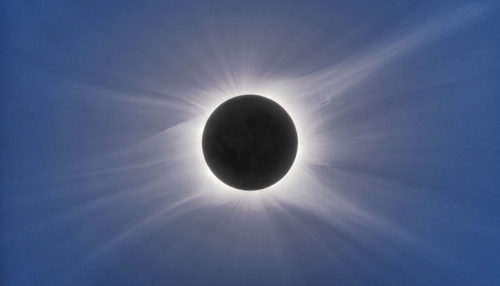
The sun’s corona is visible only during a total eclipse
An American Exclusive
A total solar eclipse that’s exclusive to the USA is pegged as a first-ever in recorded history. Some 12 million Americans live in the path of totality and an additional 7.4 million Americans are expected to head out to experience the first total solar eclipse to span the nation since 1918. All in, about 220 million Americans live within a day’s drive of experiencing totality.
Millions just outside the path will be semi-thrilled with a glancing blow of the moon’s shadow blocking out the sun. However, purists maintain that even with 99 percent of the sun covered by the moon’s shadow, the remaining sliver of sunlight spoils the spectacular effect of a total eclipse.
No matter where you are in the continental USA, a partial eclipse will be visible to everyone. The farther away people are from the path of totality, the more off-center the moon will appear in front of the sun. An interactive map from NASA helps people figure it all out.
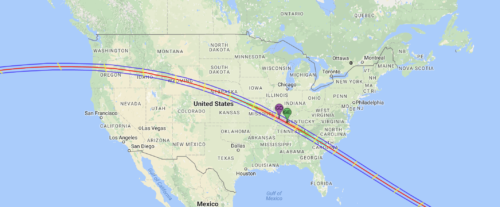
NASA produced an interactive map for The Great American Eclipse, 8/21/2017
Oregon to South Carolina
Lucky folks. At 10:15 a.m., the all-important path of totality embraces the Oregon coast. About 1.1 residents of the Beaver State need only look up, as they live under it. Portland..not so much. Residents in the state’s largest city need to get a move on or enjoy only 99.3 percent of totality at 10:19 a.m.
From there, the moon’s shadow races across 2,500 miles, throwing its transcontinental blanket across the USA before reaching South Carolina in just 94 minutes. According to Space.com, that works out to around 1,600 miles per hours, or about three times faster than a commercial jetliner.
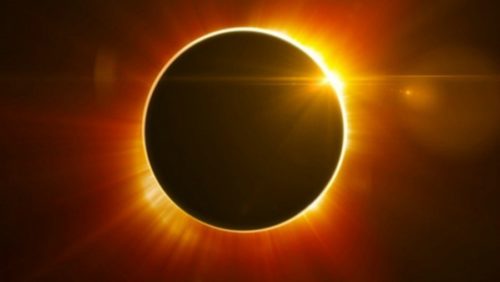
Salem, Oregon is among the very first places in path of totality on Aug. 21, 2017
Don’t Look Now
At total eclipse you will only see the sun’s flaming corona; temperatures drop, the sky darkens, and stars become briefly visible in the daytime. Only at the precise moment the sun is fully covered can one look directly at it. That’s a risky call fraught with potential for error. So special eclipse safety glasses are a must to prevent harmful burning of the retina, especially as the moon moves across the face of the sun.
NASA and the American Astronomical Society (AAS) caution safety glasses be sourced only from the suppliers, distributors, and manufacturers that meet ISO standards, including Rainbow Symphony, American Paper Optics, Thousand Oaks Optical, TSE 17, and Baader Planetarium.
You’re looking for the ISO logo and a statement attesting to their ISO 12312-2 compliance, while a flurry of fake eclipse glasses is flooding the market, with Amazon conducting a sudden product recall. Some 6,900 libraries are distributing more than 2 million compliant safety glasses, as well as museums and science-related enterprises and organizations. The National Park Service answers frequently asked questions about viewing safety.
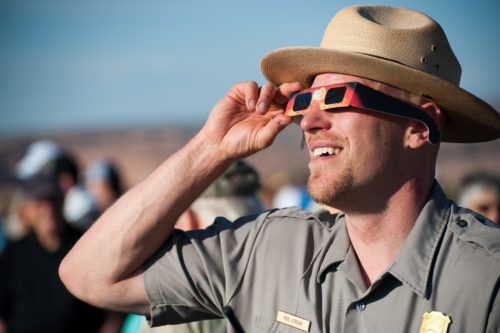
Wear certified safety glasses or don’t look at the sun during an eclipse
Last Minute Eclipse Escape
Will you be in the in the right place to see extraordinary, sudden midday darkness envelop everyone and everything? Watch NASA’s visualization on the map.
The whole spectacle lasts no more than two to three minutes. The totality lineup: Oregon, Idaho, Wyoming, Nebraska, Kansas, Missouri, Illinois, Kentucky, Tennessee, Georgia, North Carolina and South Carolina. And close but no cigar: Montana and Iowa.
Madras, Oregon is tiny but their three-day Oregon SolarFest at the Jefferson County Fairgrounds will be massive. While 5,500 campsites are sold out, Eugene, Bend, and Redmond are within shouting distance.
Idaho Falls, Idaho would have been a great idea last year. It’s so close to Yellowstone, Grand Teton National Park, and Jackson Hole that everyone and their uncle is headed there.
Casper, Wyoming isn’t fooling around. With their 5k elevation under typically clear skies, they’ve got a rather serious, educational four day Astrocon Conference all lined up with the Astronomical League.
Alliance, Nebraska is home to Carhenge, America’s second wackiest attraction, according to TripAdvisor reviewers. This tribute to Stonehenge made of 39 old cars standing on end is a big deal in the town of 8,500.
The local tourist board has planned a concert, a mega softball tournament, a Native American powwow, and some home cooked meals served at church. And since the beans will be harvested, there’s plenty of room to park in the fields, they say.
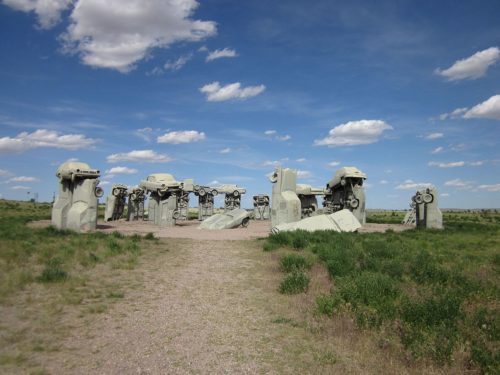
Carhenge in Alliance, Nebraska falls in the path of totality for 2017 solar eclipse
Kansas City, Missouri is keeping an eye on the animals at the Kansas City Zoo. How they react should be interesting to observe. Coveted eclipse glasses will be made available complimentary to all guests checking in at a city hotel on Sunday, August 20.
St. Joseph, Missouri is proud to be only one second short of the maximum total eclipse time, getting a generous 2 minutes and 39 seconds. That’s a good enough reason to hold a giant barbecue in the Rosecrans Memorial Airport parking lot, right?
Carbondale, Illinois is the “Eclipse Crossroads of America,” for two reasons: they’re getting the maximum 2 minutes and 40.2 seconds totality experience in 2017 and they’re in the path of the next one to pass over the USA in 2024. Come to Southern Illinois University campus for the festival.
Hopkinsville, Kentucky is 73 miles from Nashville and has a population of 30,000 that will swell when the maximum duration of totality lasts for 2 minutes and 40.1 seconds. Astronomers say it’s 12 miles from where the axis of the moon’s shadow will pass closest to the center of Earth. Come learn more at their Summer Salute Festival.
Nashville, Tennessee is the largest city in the path of totality. Best of all, Nashville has produced a perfect 14-song Solar Eclipse Playlist with partner Spotify. The Sudekum Planetarium presents “Eclipse: The Sun Revealed,” and they’re throwing a free party, with live music of course, inside the Adventure Science Center.
Charleston, South Carolina is calling their two-minute citywide solar eclipse salute “Go Dark Charleston.” The first 500 people at Citadel Mall receive free solar eclipse glasses for the Official NASA Viewing Location event from 1 p.m.
Hipcamp.com is addressing the solar eclipse frenzy with a travel solution. Saying hotels, motels, park lodgings, and campsites were booked up long ago, they’ve identified 789 private campgrounds you can book for the view of a lifetime.
How Totally Close Am I?
- Napa / San Francisco 75%
- Phoenix 65%
- Dallas 75%
- Salem 100%
- Kansas City 100%
- Chicago 85%
- Atlanta 95%
- NYC 75%
- Orlando/Tampa 80%
- Charleston 100%
- Boston 65%
- Denver 95%
- Los Angeles 65%
- Washington DC/Baltimore 82%
With a hat tip to Spellbound Wines for reminding us of the fundamental connection to all growing things that we share with the sun, the moon, the Earth and beyond.
“Everyone knows the warm sun nurtures plants, bringing grapevines to full maturity. But since ancient times farmers have also depended on the moon, ruler of the tides, whose gravitational force pulls water up from the soil, supporting vines during the cool nights that maintain beautiful balance in wine grapes.”
A career-long tourism, destination, hotel sales and marketing pro, Laurie Jo Miller Farr is a dedicated urbanite who loves walkable cities and has a knack for always finding the best public restrooms. As a San Francisco-based travel and copywriter, she enjoys views from its crazy signature hills following half-a-lifetime promoting her dual hometowns, a couple of oh-so-flat places: NYC and London. Her work is found online at USA Today, Yahoo, Eater, CBS, Where Traveler, and more. She tweets @ReferencePlease and posts on Instagram @lauriejmfarr.








